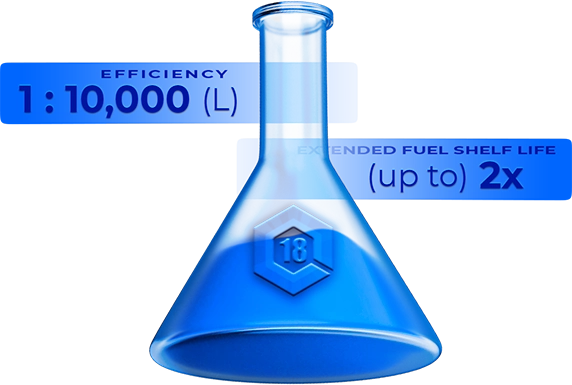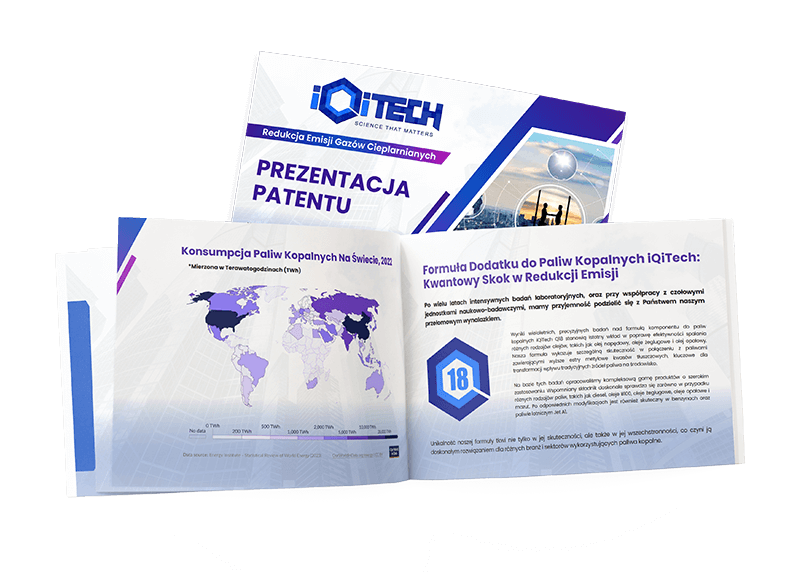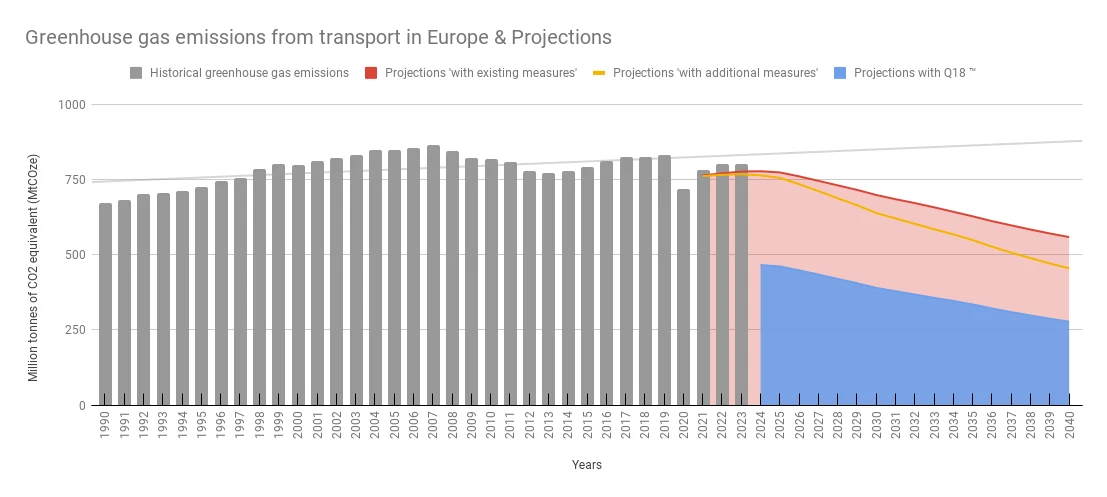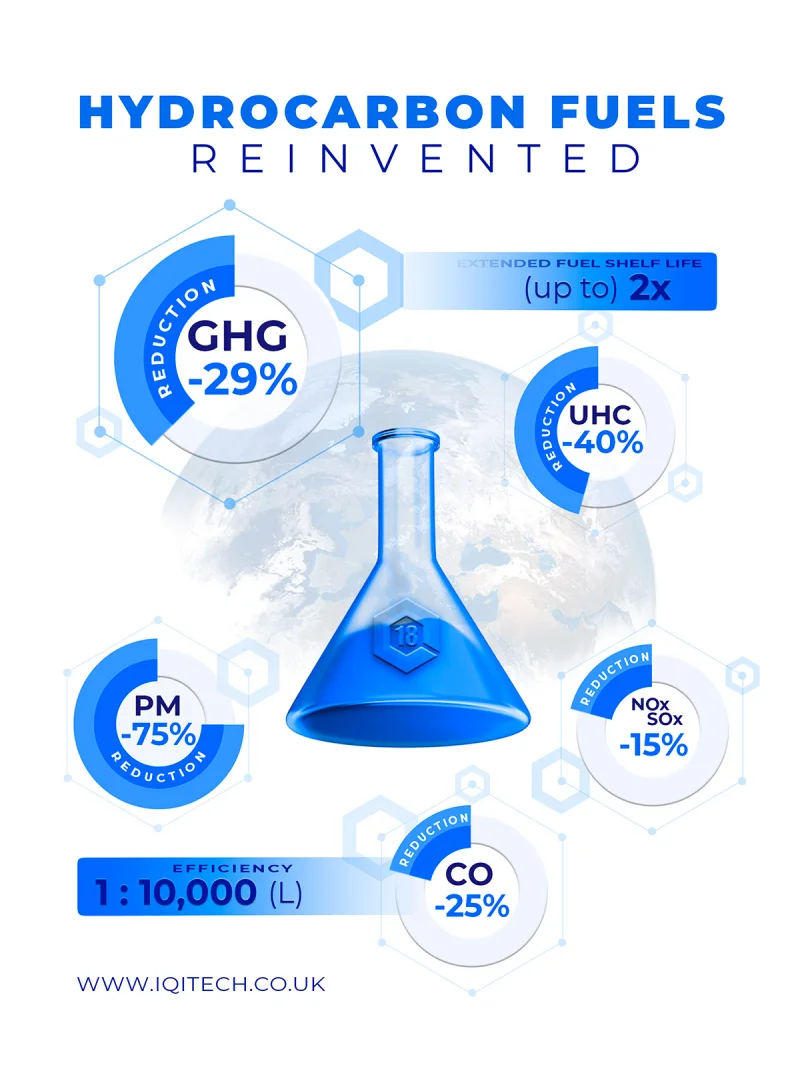Hydrocarbon Fuels
Innovation Overview and Application of Patented Fuel Hydrocarbon Component (Enhancer): Analysis of Greenhouse Gas Reduction Properties, PM Particles, and other Harmful Emissions.

- Reduction of CO₂e Emissions* 29%
- Reduction of CO Emissions* 25%
- Reduction of other harmful gases (NOX, SOX) Emissions* 15%
- Reduction of Fuel Consumption (up to)* 12%
- Reduction of Unburned Hydrocarbons (THC) Emissions* 40%
- Reduction of Particulate Matter (PM) Emissions* 75%
* The Above Charts Represent General Reductions, As Our Formula Has Been Designed To Allow Further Modifications For Specific Fuels And Special Purposes, Meeting The Most Stringent Requirements. For This Reason, The Obtained Results May Be Even Better. All Information Provided By Us Is Supported By Relevant Research, Which Is Available For Review By Interested Parties. Our Formula Is Patented And Protected By International And European Law.
In the case of the combustion of fossil fuels, the main harmful by-products, in addition to greenhouse gases, are nitrogen oxides (NOₓ), sulfur oxides (SOₓ), unburnt hydrocarbons (UHC), and particulate matter (PM).
Thanks to the use of the Q18 component, we can reduce emissions of these gases and particulate matter. The respective values are:
- Particulate Matter (PM): - REDUCTION: 75%
- NOₓ and SOₓ: - REDUCTION: 15%
- Unburnt Hydrocarbons (UHC): - REDUCTION: 40%
- Particulate Matter (PM) can lead to air pollution and health problems, especially for people with respiratory issues. Studies show that illnesses and premature deaths caused by air pollution from particulate matter are one of the most dangerous problems of modern civilization.

Data for the year 2019, source: Burden of Disease - Our World in Data
[The Burden of Disease is measured as Disability-Adjusted Life Years (DALYs). One DALY represents the loss of one year of full health, either from premature mortality or from disability.]
Air pollution from particulate matter is a serious health problem, involving solid particles and liquid droplets suspended in the air. Negative health effects include cardiovascular and respiratory diseases, with a significant economic burden on global healthcare systems.
- NOₓ and SOₓ contribute to smog, acid rain, and health problems such as respiratory diseases. In the atmosphere, they can also react with other gases, effectively creating greenhouse gases. Therefore, although they are not classified as GHGs (except for nitrous oxide - N₂O), their indirect impact on climate warming is evident.
- Unburnt Hydrocarbons (UHC) pose a serious threat to the environment and the health and life of living organisms. UHC, being incompletely burned hydrocarbon fuel particles, are released into the atmosphere due to incomplete combustion.
The emission of unburnt hydrocarbons, including methane, is undesirable because:
- It contributes to air pollution and has a negative impact on the environment.
- Methane is a greenhouse gas and contributes to global warming.
- Unburnt hydrocarbons represent lost fuel, which reduces engine efficiency.
The negative impact of UHC on the environment is manifested in contributing to air pollution and accelerating the greenhouse effect. For living organisms, UHC are equally harmful, as they can penetrate the respiratory system and bloodstream, causing health problems such as cardiovascular and respiratory diseases. Furthermore, long-term exposure to UHC may increase the risk of developing cancer.
During the preliminary research on Q18, it was confirmed that the main problem of emissions is not so much the fossil fuels themselves, but the inadequately designed combustion process, or more precisely - the chemical composition of hydrocarbon fuels, which prevents the complete combustion of the fuel in the combustion chamber (sic!). As a result of such an imperfect process, unburnt substances are released in the form of exhaust containing excessive amounts of CO2, particulate matter (PM), and other harmful gases.
On this basis, the world's first fuel component was developed, which, through the optimization of hydrocarbon fuel combustion processes, drastically reduces the emissions of harmful gases and particles, while also improving the engine operating conditions.
From the patent documentation 243340 B1, we learn that the invention relates to an improved additive for diesel fuel (B7, B100), especially one that contains fatty acid methyl esters (FAME).
The innovativeness of the patented component lies in the use of a complex composition that improves the fuel combustion process and reduces the emission of harmful substances, which translates into higher engine efficiency and a reduction in the emission of toxic exhaust components. The component consists of dicyclopentadienyl iron and its alkyl derivative, a polymeric surfactant, and a solvent, which together create a synergistic effect that increases the cleanliness of the exhaust and reduces fuel consumption.
The essence of the Q18 action is the catalysis of the combustion of hydrocarbons, soot, and carbon monoxide, as well as the maintenance of the cleanliness of the fuel supply system. As a result, even with a minimal concentration of the additive in the fuel (1:10,000 L), it is possible to significantly reduce the emissions of harmful substances, such as carbon monoxide, unburnt hydrocarbons, and particulate matter.
What was the greatest achievement for the creators of this invention, and what exactly did they accomplish that other researchers failed to achieve?
Challenge:
The main challenge was to create a component that, through the improvement of hydrocarbon fuel combustion processes, reduces emissions of particulate matter and other toxic exhaust components, while also extending the lifespan of engines, which is particularly important for health and the environment.
Innovation:
The inventors of the invention made a breakthrough in scientific research by developing a multifunctional modifier for diesel fuel (B7, B100), heating oil (light and heavy), heavy fuel oil, and marine fuels, which improves the combustion process of all fractions and thereby greatly reduces the emission of harmful substances. The achieved formula is particularly effective in the case of fuels containing fatty acid methyl esters (FAME), which are a component of biodiesel.
Groundbreaking Achievements:
The scientists managed to achieve synergy of the additive's components, which resulted in a significant reduction in particulate matter emissions (up to 77% in the case of B100 fuel) and other toxic exhaust components, while maintaining the lubricity and low-temperature properties of the fuel.
Competitive Advantage:
The component according to this patent shows clearly better results compared to other solutions, such as conventional detergents or other commercial products containing iron compounds, as confirmed by the conducted research and tests.
What impact does the Q18 formula have on engine lifespan?
The Q18 component achieves a significant improvement in fuel combustion processes, which translates into several benefits for engine lifespan:
- Reduction of Toxin Emissions: The Q18 formula reduces emissions of harmful substances such as carbon monoxide, unburnt hydrocarbons, and particulate matter, which can contribute to longer engine lifespan.
- Protection of the Fuel System: The detergent contained in the component helps maintain the cleanliness of the fuel supply system, preventing the deposition of contaminants and potentially extending engine runtime.
- Efficiency Improvement: The iron compounds in the formula catalyze the combustion of soot and solid organic substances, leading to more efficient combustion, increased overall engine efficiency, and reduced fuel consumption.
- Reduced Coking: The component reduces the degree of coking of the injector tips, which can contribute to an even fuel flow and better engine performance.
- Support for Biodiesel: The component is compatible with biodiesel, supporting the development and use of renewable fuels with a smaller environmental impact.
In addition to emission reductions, the use of the Q18 component has also been observed to have other valuable properties, such as:
- Fuel consumption reduction (7-12%);
- Extended engine lifespan and cleanliness of the particulate filter (DPF);
- Reduced AdBlue consumption (if used);
- Nearly double the fuel storage/shelf life (slowed aging processes).
Sources:
- Q18 Patent Documentation
- Global Warming Potential Values (16 February 2016)
- IPCC Fifth Assessment Report (AR5), Chapter 8, Working Group I
- Burden of Disease - Our World in Data
Tables are not available on mobile devices!
Please view this page on a larger screen…
In addition to the many advantages of this formula, such as the possibility of immediate implementation without the need for any modifications to existing engines, there is its incredible efficiency:
1 liter Q18 is designed for refine
liters of base fuel…
Now let’s check how these numbers would translate into an actual reduction of the problem in question if Q18 were applied on a mass scale.
Based on: www.eea.europa.eu
Comments:
– The graph shows the trend in greenhouse gas emissions from the transport sector since 1990 and the forecast until 2040 at EU level (EU-27). The 2023 values are preliminary estimates reported by Member States.
– The given values include all emissions from domestic transport. They do not include international aviation and international maritime transport, or emissions related to the production of electricity used in transport (e.g. trains, trams, electric vehicles).
– The ‘with existing measures’ projection scenario reflects the impact of existing policies and measures on future emissions, while the ‘with additional measures’ scenario also includes further planned policies and measures notified by Member States.
– If breakthrough solutions to reduce gas emissions are not implemented, despite the most “optimistic” forecasts, the only thing we can count on is a reduction in emissions to a level similar to that from 3 decades ago.
– Chart Q18 shows the total CO₂e reduction (29%), which can be subject to change based on the fuel type. Our patent leaves space to modify and refine the formulation further to meet specific criteria.
It is estimated that if all vehicles in the country started using fuel improved with the Q18 formula, there would be a dramatic 30% drop in CO2 emissions (and other gases and PM, respectively) and the visible effects would be felt by all of us within just 3 months! But these are not the only benefits.
The Q18 formula can be successfully used in other emission-burdened sectors, such as maritime and air navigation, as well as power plants and combined heat and power plants, which further reduces pollution on the global emissions map. Our component causes afterburning of all fractions in the combustion process itself, working perfectly in all heavy oils dedicated to professional power generation.
Summary
As the world tries to reduce greenhouse gas emissions, which are essentially the result of imperfect fuel combustion processes, our innovative solution at iQiTech focuses on improving the combustion process itself. By addressing the root cause rather than merely treating the symptoms, we have developed a novel compound that radically reduces gas and particulate emissions from petroleum-based fuels. This transformative approach holds the promise of mass-scale application and tangible, large-scale impact in the global fight against climate change.
“Q18 Is The Missing Link In The Fossil Fuel Production. If We Had Developed This Technology Earlier, The World Now Would Be Not Standing At The Edge of Climate Disaster!”
The widespread adoption of iQiTech’s innovative Q18 formula holds immense potential to turn the tide in the global fight against emissions and environmental degradation. By addressing the root causes of pollution through optimized fuel combustion, this transformative solution promises a cascade of benefits – from reduced contamination and enhanced energy efficiency, to tangible financial savings and improved public health.
Moreover, the Q18 compound’s ability to mitigate the environmental toll represents a critical component in the complex, multi-faceted battle to safeguard our climate. Yet, unlocking the full impact of this technology will require a concerted global commitment, international cooperation, and steadfast political and social support. With the collective resolve to enact meaningful change, iQiTech’s pioneering work can play a pivotal role in steering humanity toward a more sustainable future!








Contact Us
Choose one of our departments







